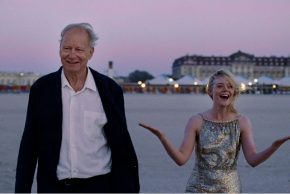The Ligeti 100 continues to rumble on, with centenary concerts in Hungary and around the world, and the audience shows more and more enthusiasm for the futuristic and modern masterpieces of one of Hungary’s most famous composers. We recently wrote about a concert by Péter Eötvös and Klangforum Wien, and soon Eötvös – one of the most knowledgeable stewards of Ligeti’s immense legacy – will conduct the composer’s works again at Müpa Budapest, this time with Concerto Budapest.
The second half of the concert on 18 May will feature the Requiem, one of the most influential works in 20th century music history, and well known even to those who are not particularly interested in classical music from the film 2001: A Space Odyssey. This monumental work for two mixed choirs, a large orchestra and soprano and mezzo-soprano solos was commissioned by Swedish Radio in the first half of the 1960s. Ligeti spoke of the well-known work, written to an ancient text, in an interview with Péter Várnai:
“It has my own fears, real experiences, a lot of childhood fear fantasy, but also their release. So that I really do not have be afraid.”
Requiem, which requires a great deal of preparation, is rarely heard on concert hall programmes today because of the unusually long rehearsal process required to perform it. During the rehearsals for the premiere, Ligeti received a telegram from the choirmaster asking him to come to Stockholm immediately because they were all terrified of the piece, feeling unable to learn it.
“Of course they knew, they just took everything too seriously . (…) I explained to the choir that it’s good if their singing isn’t completely perfect. They should try to approach the rhythmic and melodic accuracy of the score, but it’s okay if they make small mistakes, the mistakes are calculated,”
– the composer said.
The Requiem has an indescribable effect on the listener: even recorded, it evokes a powerful catharsis and stays with us for a long time afterwards – and in live performance it promises to be a life-changing experience.
Before the Requiem, Concerto Budapest will perform three orchestral pieces. The first is Melodien, written in 1971, during a period of departure from the musical structure known as the micropolyphony. Ligeti was commissioned by the city of Nuremberg to compose this piece, which lasts just under a quarter of an hour, to mark the 500th anniversary of Dürer’s birth. Small in size and compact, yet written for full orchestra, Melodien synthesises the stylistic trends that Ligeti was working with in the 1960s. The composer described the micro-polyphony he developed as a dense web, a spider’s web, in which polyphony is no longer audible. In the micropolyphony, the distinction between melody, harmony and rhythm is practically dissolved. In the Melodien, however, as the title suggests, a single trembling, vibrating melody reappears from this dense, unstructured web. As Ligeti wrote:
“I have tried to soften the dense ‘micro-polyphony’ of my musical language, to make it less austere, more transparent. Basically, I have remained faithful to my earlier style: the musical form unfolds like a spreading, continuously flowing web of time – but the individual notes no longer melt together (as in my earlier music), but are recognisable as intertwining. The notes become independent melodies, with their own distinctive style, tempo, rhythm and interval structure.”
Melodien is followed by Clocks and Clouds, the title of which refers to an essay by Anglo-Austrian philosopher Karl Raimund Popper. Popper divides the processes in nature into two groups: one containing the exact, precisely measurable events (i.e. clocks) and the other containing the irregular, disordered and more or less unpredictable events (clouds). Ligeti described Clocks and Clouds as one of his simplest pieces.
“I liked the title of Popper’s essay, and it evoked in me musical associations in which rhythmically and harmonically precise forms gradually transform into diffuse sound textures and vice versa,” he said.
The clocks in this music thus dissolve into clouds, and the clouds thicken into clocks. The composer also cited Dalí’s famous painting The Persistence of Memory as an inspiration: the melting, dissolving clocks are transformed from the measurable and exact into the irregular and chaotic. In the work, precise rhythms evoking the clocks are juxtaposed with microtonal harmonies (the clouds) that exude a strong mood, resulting in a dynamic dichotomy. In addition to the orchestra, Ligeti also includes a female choir of 12 voices in Clocks and Clouds, but there are no lyrics: the singers sing the phonemes of the international phonetic alphabet.
The last piece before the interval, San Francisco Polyphony 74, was commissioned by the San Francisco Symphony Orchestra.
“When I composed San Francisco Polyphony, I thought the atmosphere of the city would define the piece, or at least be in the piece. Then when I listened to it, I realised it was more Viennese, with a lot of expressive melodies reminiscent of Alban Berg or Mahler. Perhaps only the prestissimo tempo of the final movement, with its machine-like hecticness, reminds me of a big American city.”
The conductor of the evening, Péter Eötvös, is two decades younger than his master, with whom they share a musical mother tongue.
“Ligeti’s style is unique. He was able to create an extremely broad vision of the relationship between his own compositional technique and a wide variety of mathematical, philosophical and technical phenomena. His interest in musicology and his knowledge of the whole of European music literature – from the early Middle Ages to the ‘near future’ – have strongly influenced the musical material of his works. This was later combined with the music cultures of the Americas and Africa in particular. (…) I think that the astonishing sound world created at the highest level, which we are trying to decipher again and again with an ‘incredible’ eye and ear, as in Escher’s paintings, is what is most characteristic of Ligeti, even now, 100 years after his birth”
– Eötvös said in his recently published memoir, My Meetings with György Ligeti (Mis encuentros con Ligeti).
The concert will take place on 18 May at the Béla Bartók National Concert Hall. [UPDATE: it has been subsequently rescheduled because of a cancellation due to ill health.] The Concerto Budapest and the Hungarian Radio Choir will be conducted by Péter Eötvös, with Sarah Defrise and Szilvia Vörös as soloists.
Article: Anna Rácz
Translation: Zsófia Hacsek

























Comments